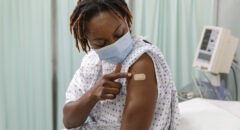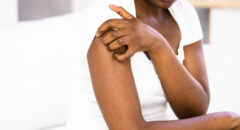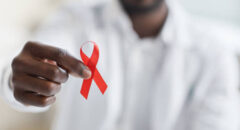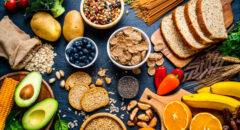
Maintaining a balanced and nutritious diet is crucial for everyone, but it’s especially important for those living with HIV. A well-planned diet can help boost your immune system, manage symptoms, and improve overall well-being.
In fact, HIV treatment teams often include dietary counselors, who underline the importance of adjusting nutrition and calorie needs depending on how a person responds to Antiretroviral Therapy (ART), Everyday Health notes. Those living with HIV may also require more calories to maintain a healthy weight than someone without HIV, according to the Academy of Nutrition and Dietetics.
“For people living with HIV, a healthy diet helps lower the likelihood of developing heart disease, cancers, and other conditions, while improving the quality of life,” Allison Webel, Ph.D., RN, professor and associate dean for research at UW School of Nursing in Seattle, tells Everyday Health.
Let’s take a closer look at what you should eat when you have HIV and what you should avoid.
1. Prioritize a Variety of Nutrient-Rich Foods
Aim to include a colorful array of fruits, vegetables, whole grains, lean proteins, and healthy fats in your meals. This ensures you receive a wide range of vitamins, minerals, and antioxidants that support your immune system and overall health.
Antiretroviral drugs used to treat HIV can cause bone demineralization (weakened bones) and increase cholesterol and triglyceride levels. A nutrient-rich diet can help combat some of these side effects.
The following are great sources of nutrition:
- Vitamin D is Available in fortified milk and fatty fish, and made by the body through sun exposure, vitamin D helps strengthen bones, says the American Academy of Orthopaedic Surgeons (AAOS).
- Calcium Calcium is also crucial to bone health. It’s available in fatty fish, dairy products, and calcium-fortified non-dairy milk and orange juice.
- Iron Red meat can help the body make hemoglobin, the blood component that helps transport oxygen. Leafy greens, seafood, whole-grain breads and pastas, eggs, liver, and even dark chocolate also boost iron levels, according to the U.S. Food and Drug Administration (FDA).
- “Good” Fats High-quality olive oil, avocados, and nuts, as well as salmon, tuna, and other oily fish, promote cell growth and provide energy, says Mayo Clinic.
RELATED: The Ultimate Nutrition Guide for People Living with HIV/AIDS
2. Lean Protein Sources
Incorporate lean protein sources into your diet. These foods provide essential amino acids that aid in repairing and building tissues, helping your body stay strong.
The Academy of Nutrition and Dietetics recommends that people with HIV include protein-rich foods at all meals, such as lean beef, organic chicken, turkey, oily fish, eggs, fat-free and low-fat dairy foods, or from nuts and nut butters, beans, and seeds. Protein-dense options derived from soybeans, like edamame and tofu, are also great options for your HIV diet, according to Johns Hopkins Medicine.
The American Academy of Nutrition and Dietetics cautions against eating raw or undercooked meat, fish, and eggs and unpasteurized dairy products, which can cause foodborne illness. You should also use separate knives and cutting boards for raw meats and produce.
Dr. Webel tells Everyday Health, you should aim to consume 1 to 1.4 grams of lean protein per kilogram of weight daily. “This can be a combination of plant and animal sources of protein depending on the Individual’s preferences and food accessibility,” she says.
3. Good Fats Matter
Healthy fats, like those found in avocados, nuts, seeds, and olive oil, are beneficial for your heart health and can help you maintain a healthy weight. They also contribute to better absorption of fat-soluble vitamins.
4. Load Up on Antioxidant-Rich Foods
Fruits and vegetables are rich in antioxidants, which can help fight inflammation and support your immune system.
“Hands down, eating vegetables, whether fresh or frozen, is one of the best things people with HIV can do,” says Dr. Webel. She recommends consuming a “rainbow” of foods, including fresh fruits; dark green leafy vegetables (kale, spinach, broccoli); red, orange, and yellow produce (beets, yellow peppers, carrots); and beans, peas, legumes, and starchy vegetables.
To protect your weakened immune system, make sure you wash fruits and vegetables before eating raw or cooking to remove any potentially harmful bacteria or other germs.
5. Stay Hydrated
Drinking enough water is vital for everyone, especially those with HIV. Hydration helps maintain bodily functions, supports digestion, and aids in circulation. Water can also help you manage your weight and monitor your calorie intake.
Herbal teas and infused water are great alternatives to plain water if you’re looking for variety.
6. Adequate Fiber Intake
Fiber-rich foods such as whole grains, legumes, fruits, and vegetables aid in digestion, promote gut health, and help manage cholesterol levels.
“Given the risk for poor nutrient absorption due to HIV-related inflammation, an easy-to-prepare meal, like one that consists of brown rice and beans, can provide adequate protein, fiber, and other nutrients at a relatively low cost,” Webel notes.
7. Incorporate Probiotics
Probiotic-rich foods like yogurt, kefir, sauerkraut, and kimchi introduce beneficial bacteria to your gut, promoting a healthy digestive system and enhancing your immune response.
RELATED: Day 1: Just Diagnosed with HIV
8. Mindful Carbohydrate Choices
Opt for complex carbohydrates like whole grains, fruits, and vegetables, which provide sustained energy and stabilize blood sugar levels. These choices are better than refined carbohydrates, which can lead to energy crashes.
9. Manage Weight with Portion Control
Maintaining a healthy weight is important, as excessive weight loss or gain can impact your immune system and overall health. Practice portion control to ensure you’re getting the right amount of nutrients without overeating.
10. Limit Processed and Sugary Foods
Processed foods high in added sugars and unhealthy fats can negatively impact your immune system and overall health. Minimize their consumption and opt for whole, natural foods whenever possible.
11. Consider Nutritional Supplements
In some cases, nutritional supplements may be recommended by your healthcare provider to ensure you’re meeting your nutrient needs. Discuss with your doctor before adding any supplements to your routine.
Consulting a Registered Dietitian
Maintaining a healthy diet plays a vital role in managing your HIV and supporting your overall well-being. By incorporating a variety of nutrient-rich foods, staying hydrated, and making mindful choices, you can enhance your immune system, manage symptoms, and enjoy a higher quality of life. Remember, a balanced approach to nutrition, along with regular medical check-ups, can make a significant difference in your journey with HIV.
Every individual’s nutritional needs are unique. Consulting a registered dietitian who specializes in HIV nutrition can provide you with personalized guidance and meal planning tailored to your health requirements.








